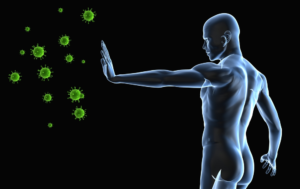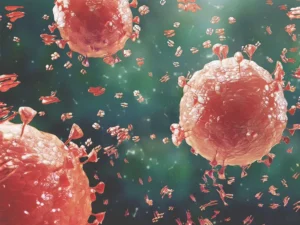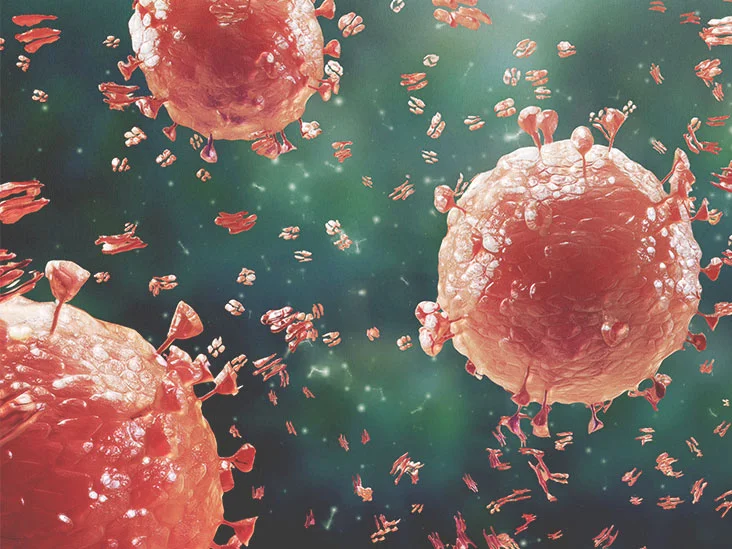The Science Behind a Strong Immune System
1. Introduction
A robust immune system serves as a shield, defending our body against a barrage of potential threats. Its pivotal role in safeguarding our health cannot be overstated. In this blog post, we embark on a journey through the intricate science underlying a resilient immune system, unveiling the remarkable mechanisms that keep us healthy and protected.
2. Understanding the Immune System: Basics and Components
The immune system is a complex network of cells, tissues, and organs working harmoniously to shield us from harm. White blood cells, antibodies, and the lymphatic system form the cornerstone of this intricate defense mechanism. Together, they vigilantly patrol our body, detecting and thwarting invaders with incredible precision.

3. Immune System and Pathogen Interaction
The captivating dance between our immune system and pathogens unfolds with remarkable precision. Immune cells, like valiant warriors, recognize foreign intruders and activate a cascade of defenses. From engulfing pathogens to producing antibodies, these mechanisms neutralize threats. Inflammation and fever, though often seen as symptoms, are in fact strategic maneuvers by the immune system to repel invaders.

4. Immunization: Strengthening Immunity Through Vaccination
Immunization, a triumph of scientific innovation, bolsters our immune system’s prowess. Vaccines introduce harmless fragments of pathogens, prompting our immune cells to mount a defense. This process equips our immune memory, ensuring a rapid and potent response upon encountering the real enemy. The profound impact of vaccines in eradicating or reducing the severity of diseases cannot be overstated.

5. Nutritional Impact on Immune Health
Our diet wields a profound influence on immune function. Essential vitamins like C and D, along with minerals like zinc, act as vital allies, empowering our immune cells. A balanced diet rich in nutrients provides the ammunition needed for our immune system to function optimally, enhancing our ability to fend off infections.

6. Sleep, Stress, and Immune Resilience
A good night’s sleep is not only a restorative balm for the mind but a tonic for the immune system. Sleep deprivation weakens our immune response, rendering us vulnerable. Chronic stress, too, takes its toll, dampening immune function. Fortifying our immune armor requires managing stress and prioritizing quality sleep.

7. Gut Health and Immune System
The gut, often referred to as the “second brain,” shares an intimate connection with our immune system. Gut microbiota, the diverse community of microbes residing within, play a pivotal role in training our immune cells and fine-tuning responses. Nurturing a healthy gut through dietary choices and lifestyle habits is akin to nurturing our immune shield.

8. Exercise and Immunity: Finding the Balance
Exercise, a powerful tonic for overall health, extends its benefits to the immune system. Moderate, regular exercise bolsters immune function, enhancing the mobility of immune cells and promoting their vigilant surveillance. Striking the right balance is paramount, as excessive exercise can actually strain our immune defenses.

9. Aging and Immune Function
As the years gracefully advance, so does the evolution of our immune system. Immunosenescence, the gradual decline in immune function, accompanies aging. However, proactive measures such as a nutrient-rich diet, regular exercise, and vaccination can help mitigate these changes and promote immune vitality in older adults.

10. Environmental Factors and Immune Response
Our environment, though teeming with life, can also harbor toxins and pollutants that challenge our immune resilience. Minimizing exposure to these environmental stressors is pivotal in maintaining a sturdy immune defense. Protecting our immune citadel involves adopting mindful habits and safeguarding the air we breathe and the water we drink.

11. FAQs
Q1: What is the immune system?
A: The immune system is a complex network of cells, tissues, and organs that work together to protect the body from infection and disease.
Q2: What are some of the components of the immune system?
A: Some of the components of the immune system include:
- White blood cells: White blood cells are the body’s first line of defense against infection. They attack and destroy foreign invaders, such as bacteria and viruses.
- Antigens: Antigens are molecules that the body recognizes as foreign. When the body encounters an antigen, it produces antibodies, which are proteins that bind to the antigen and help the body fight it off.
- Lymph nodes: Lymph nodes are small, bean-shaped organs that filter lymph fluid, which is a clear fluid that flows through the body. Lymph nodes contain white blood cells, which help to fight infection.
- Spleen: The spleen is an organ that is located in the upper left abdomen. It filters blood and removes old red blood cells and foreign particles. The spleen also stores white blood cells and helps to fight infection.
Q3: What are some of the factors that can weaken the immune system?
A: Some of the factors that can weaken the immune system include:
- Stress: Stress can weaken the immune system by suppressing the production of white blood cells.
- Poor diet: A poor diet that is low in essential nutrients can weaken the immune system.
- Lack of sleep: Lack of sleep can weaken the immune system by impairing the body’s ability to fight infection.
- Certain medications: Some medications, such as steroids, can weaken the immune system.
- Chronic diseases: Chronic diseases, such as HIV/AIDS and cancer, can weaken the immune system.
Q4: What are some of the things you can do to boost your immune system?
A: There are a number of things you can do to boost your immune system, including:
- Get enough sleep: Most adults need around 7-8 hours of sleep per night.
- Eat a healthy diet: A healthy diet should include plenty of fruits, vegetables, and whole grains.
- Exercise regularly: Exercise helps to strengthen the immune system.
- Manage stress: Stress can weaken the immune system, so it is important to find ways to manage stress, such as yoga or meditation.
- Avoid smoking: Smoking can weaken the immune system, so it is important to quit smoking if you smoke.
- Get vaccinated: Vaccines help to protect the body from infection.
Q5: What are some of the signs and symptoms of a weak immune system?
A: Some of the signs and symptoms of a weak immune system include:
- Frequent infections: People with weak immune systems are more likely to get sick.
- Longer recovery times: People with weak immune systems may take longer to recover from illness.
- Unexplained weight loss: Unexplained weight loss can be a sign of a weak immune system.
- Fever: Fever is a sign that the body is fighting infection.
- Night sweats: Night sweats can be a sign of a weak immune system.
Q6: If you are concerned about your immune system, who should you talk to?
A: If you are concerned about your immune system, you should talk to your doctor. Your doctor can assess your risk factors for immune system problems and recommend ways to boost your immune system.
12. Conclusion
The science behind a robust immune system unveils a tapestry of interconnected factors that influence our health. Armed with this knowledge, we hold the power to cultivate a formidable immune fortress. By nourishing our body with wholesome nutrition, cherishing restorative sleep, managing stress, and adopting a holistic approach to well-being, we pave the way for a life brimming with vitality and resilience. As you embark on this journey, remember that every small step towards immune health is a giant leap towards a brighter and healthier future.

